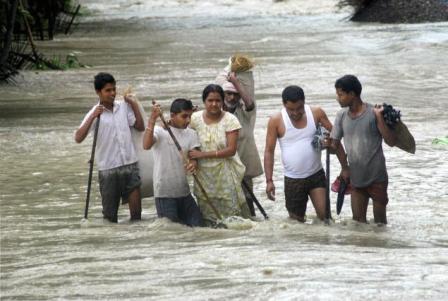
Itanagar, September 22: Flood situation in four districts of Arunachal Pradesh remained grim with major rivers and their tributaries flowing above the danger mark.
Water has entered all low lying areas of Lohit, Dibang Valley, Changlang and East Siang districts, but the death toll remained one, officials said.
In Lohit, the worst-affected district, an SOS has been sent to the state government for immediate arrangement to evacuate the marooned persons of Tezu and Namsai sub-division, Deputy Commissioner R.K. Sharma said.
Altogether 411.10 mm rainfall was recorded in the district since Friday, Mr. Sharma said adding, the sole death was reported on the night of September 20, 2012.
He said floodwaters entered Tezu town threatening the Shivajinagar locality. The Afragam, Duraliang, Danglat, Changliang and Khoraliang areas in Tezu circle were also hit.
Altogether 16 relief camps were operating in the district with 2,332 inmates. A rescue team tried to reach the spot with elephants but failed due to the torrent of water.
The district administration has also requisitioned the service of helicopter but it could not materialise due to torrential rain and bad weather condition, Mr. Sharma said.
Many villages like Mabira, Morapat, Mazgaon, Alubari, Tekelibam, Tengapani of Namsai sub-division were cut off due to flood.
BRO authorities said restoration work would take three to four more days provided weather permits.
Tezu township is reeling without power for two days as floods damaged electricity supply system at Alubari, which also supplies power to Anjaw and Lower Dibang Valley districts besides the Sadiya sub-division in Assam, Assistant Engineer A. Yirang said.
A rainfall of 836.69 mm over the past six days has lashed Dibang Valley district and the flood situation is likely to worsen if the showers do not subside in coming days, district officials said.
The increase in water level of rivers has flooded Simari, Iduli, Abali, Idili and Bolung villages.
In East Siang district, the flood situation continues to be grim with Pasighat-Pangin road and the power line remaining cut off due to rain-triggered landslides following damage of bridges and electric poles, district sources said.
The gushing waters have not only damaged the standing crops but also eroded a huge area of paddy fields causing huge losses to Pokdum, Tekang, Gobo, Poglek, Labo, field areas.
Overflowing waters of the river breached embankment at many places, threatening Borguli village.
Sources said flood waters entered Bordumsa and Diyun circles of Changlang district.





Comments
Add new comment